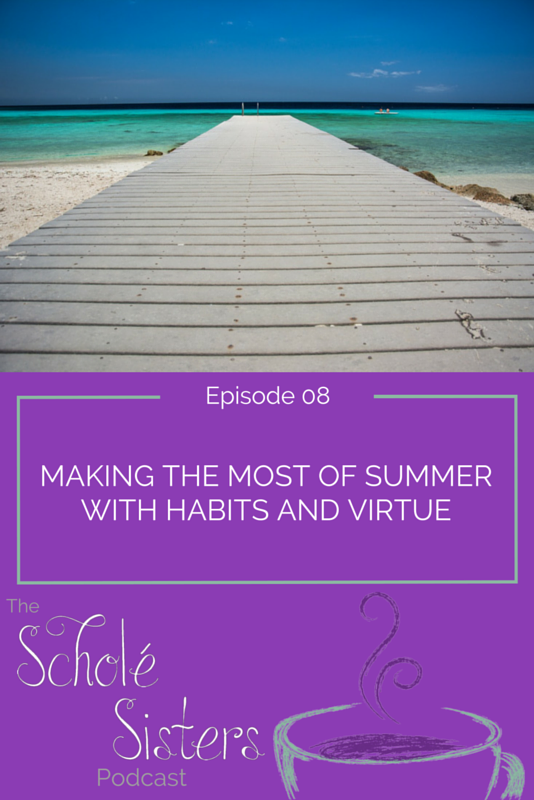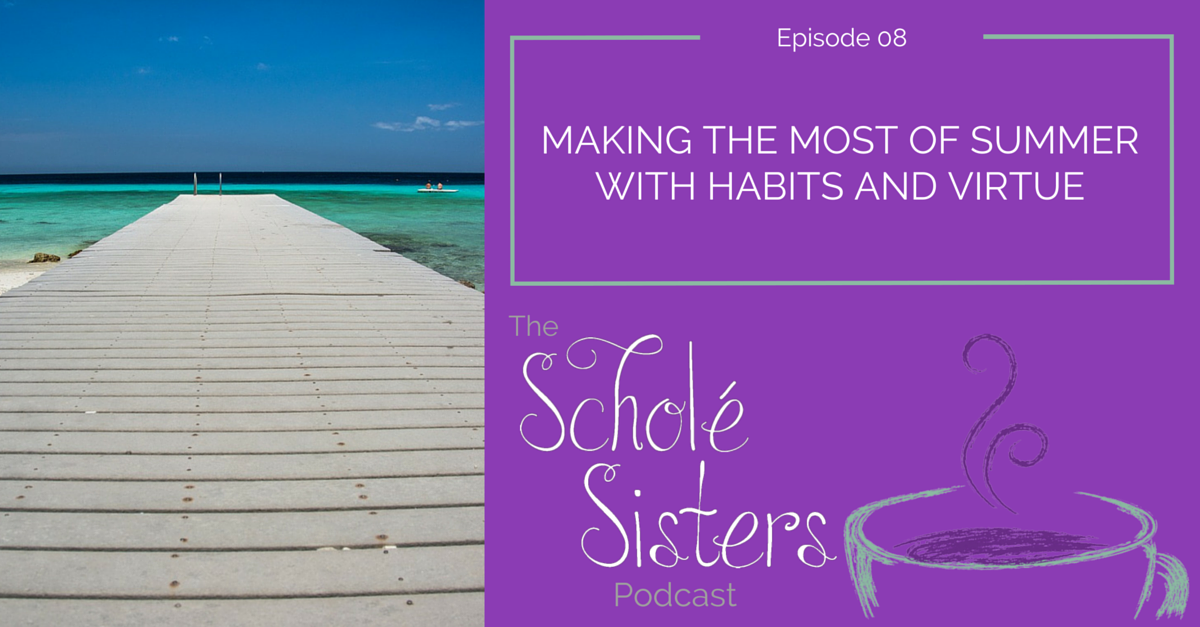SS #08: Making the Most of Summer with Habits and Virtue
In today’s episode, Mystie and Brandy use Aristotle’s Nichomachean Ethics to discuss the connection between habits and virtue, and then proceed to convince themselves to work on shoring up good habits over the summer to pave the way for a better school year. They talk about different types of habits to build, as well as how to build them. They also discuss a question on assessment sent to us by Amanda Venema – and a big shout out to Amanda for being the first to leave us a recorded message!

Thank you to our sponsor:
This episode is sponsored by Plan Your Year. Plan your year is the homeschool planner that shows you how. It walks you step-by-step through creating a homeschool plan unique to your home, your kids, your family. There are over 40 printable planning pages plus an 80-page planning guide where Pam walks you through creating your plan. Nothing ever expires and you get free updates every year. It’s the only homeschool planner you will ever need. Check out a free sample pack of planning pages and more info at freehomeschoolplanner.com.
Listen to the podcast:
Podcast: Play in new window | Download
Show Notes:
- Scholé RDA
- Mystie:
The Baronet’s Song by George MacDonald
The Princess and Curdie (also mentioned)
The Princess and the Goblin (also mentioned)
- Mystie:
- Topical Discussion: Making the Most of Summer with Habits and Virtue
Nichomachean Ethics by Aristotle, Terence Irwin translation
- Don’t be afraid to read the classics!
Nichomachean Ethics, Joe Sachs translation
- What a Novel Taught Me About Housework by Mystie Winckler
- Make the Plan
- Simple Charlotte Mason habit resources
- Charlotte Mason’s habit lists from Volume 1
- Mothers Be Good to Your Daughters by Kendra Fletcher
- Nitty Gritty Homeschool Question
- Xtra Math
The Great Tradition by Richard Gamble
Please leave us a review in iTunes!
If you don’t know how to do that, click here for illustrated instructions.
Want to ask an upcoming Nitty Gritty Homeschool Question?
We now have two options! Go fill out this handy little form OR leave a voicemail and your question might be featured on a future episode of the show!









You said something that I think about a lot! “..if we’re not careful, we can become the worst version of ourselves.” And “we grow what we water.”
My husband and I have a lot of older-than-us friends (due to our lack of family help and connections–we kind of have to find and make our own family :). But what that means is I start to notice the good and bad character qualities in the older generation–things that I do or do NOT want to emulate. I’m taking notes, apparently? (no pressure to anyone I know in real life. ahem.) This always gets me thinking that I have to remain teachable and gracious!! Anyway, I just really loved that and don’t often hear people say it out loud. So thank you, you two!
Just finished the second half of the podcast! 😀 I also really loved what you said regarding assessments! Very helpful, especially the parts about not grading their work, just talking about what needs to be changed and having them change it. 🙂
I love what you said here — taking notes, remaining teachable. I think trying to learn from others (both the good and the bad) also keeps us from being judgmental — sort of helps keep our hearts in the right place, I think. ♥
I have loved all the podcasts so far and eagerly look forward to more.
I wanted to read aloud a ‘taste’ of Nicomachean Ethics in my homeschool (my kids are late teens). Which two chapters (or so) would you recommend for a ‘less is more’ intro to Aristotle?
Thank you
Personally, I would look at Book II and choose a few sections (in a row) from there. It’s such a great book and very applicable, I think, to modern life. 🙂
Thank you
Hey Ladies, I have so enjoyed and been challenged by listening to your conversations! I wanted to add to the conversation on assessment. In high school and college when I took a test, it was reassuring to me to know for sure
(after I had received my grade) that I knew the material that I had been studying. Now, if I had known about Charlotte Mason back then I might have used narration to that end. But I think it would be helpful at the end of a term or semester, if the students had a final naration of what they had learned that term. Not for the purpose of showing what they don’t know, or I’d they had learned all the things … but to lead them to make further connections across their reading as well as to celebrate all they have learned.
And though I can’t quote it, I am pretty sure that Charlotte Mason had her students do exams as well.
You all, as well as assessment, are such a blessing! Keep up the good work, ladies!!
Yes, for sure! CM did exams at the end of each term. Most of the questions did exactly what you say — gave them a chance to make connections and synthesize their knowledge across their readings. Love this! ♥
You mentioned an online math drill program in this episode but I don’t see it in the show notes. What was the name of it?
Was it Xtra Math? If so, it’s here: https://xtramath.org/#/home/index